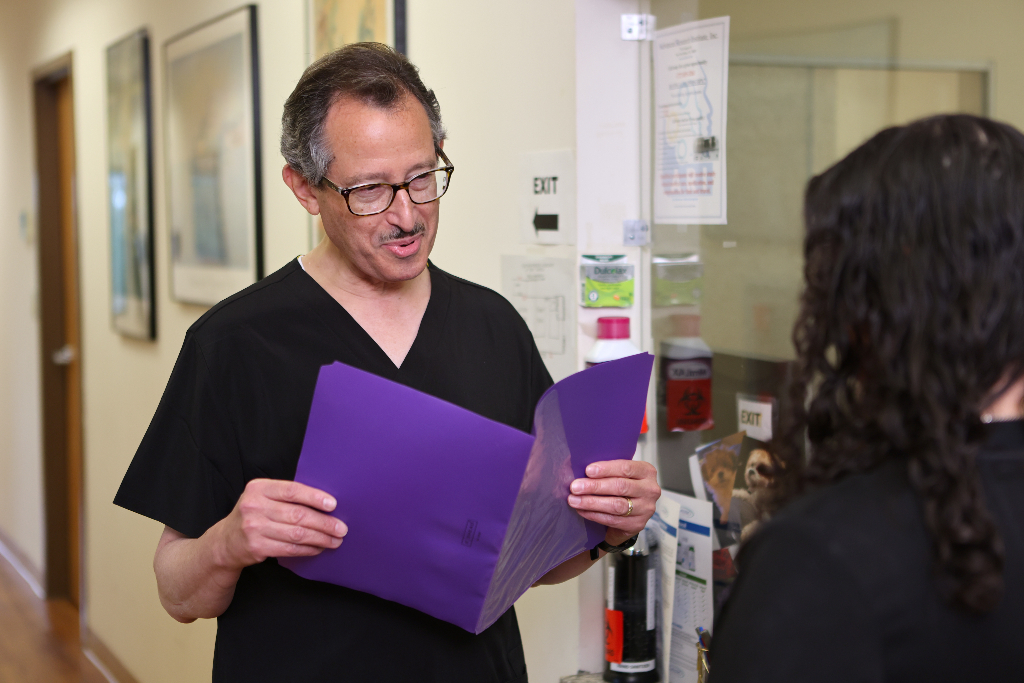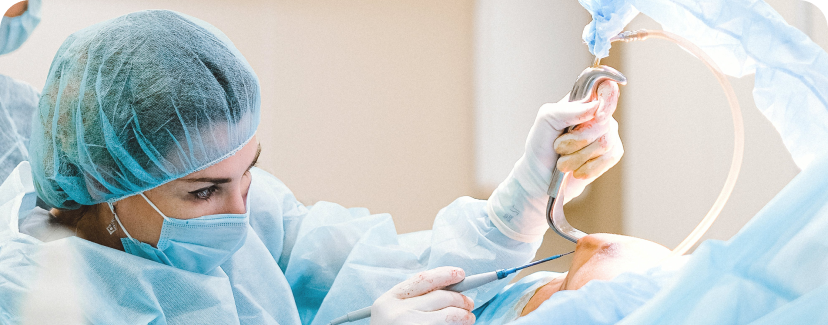What is Endoscopic Revision
after Gastric Bypass?
Endoscopic revision after gastric bypass is a procedure for patients who have had prior gastric bypass surgery and find that after initial significant weight loss they are now regaining the weight.
What is Endoscopic Revision
after Gastric Bypass?
Endoscopic revision after gastric bypass is a procedure for patients who have had prior gastric bypass surgery and find that after initial significant weight loss they are now regaining the weight.

How does Endoscopic
Revision after Gastric
Bypass work?
Endoscopic revision involves passing a lighted instrument (a gastroscope) to the area where the stomach pouch joins the small intestine. The procedure is performed under general anesthesia for maximum safety and comfort. Using the instrument, stitches are placed in order to reduce the size of the opening between the stomach pouch and the small intestine.
Stitches can also be placed to reduce the size of the gastric pouch. This procedure should help to limit the amount that can be eaten and increases the sensation of fullness after eating. This should result in renewed weight loss.
How does Endoscopic
Revision after Gastric
Bypass work?
Endoscopic revision involves passing a lighted instrument (a gastroscope) to the area where the stomach pouch joins the small intestine. The procedure is performed under general anesthesia for maximum safety and comfort. Using the instrument, stitches are placed in order to reduce the size of the opening between the stomach pouch and the small intestine.
Stitches can also be placed to reduce the size of the gastric pouch. This procedure should help to limit the amount that can be eaten and increases the sensation of fullness after eating. This should result in renewed weight loss.

What are the benefits?

Nonsurgical

No scarring

Fast recovery time

Less risk of complications
What are the benefits?
Is Endoscopic Revision a good fit for you?
- Body mass index: endoscopic revision is typically recommended for individuals with a BMI of 30 and above.
- Failed Attempts at Weight Loss: Candidates may need to demonstrate a history of unsuccessful attempts at losing weight through diet and exercise or other conventional methods.
- Commitment to Lifestyle Changes: Patients undergoing ESG should be willing to make long-term lifestyle changes, including dietary modifications and increased physical activity, to achieve and maintain weight loss.
Is Endoscopic Revision a good fit for you?

Body mass index: endoscopic revision is typically recommended for individuals with a BMI of 30 and above.

Failed Attempts at Weight Loss: Candidates may need to demonstrate a history of unsuccessful attempts at losing weight through diet and exercise or other conventional methods.

Commitment to Lifestyle Changes: Patients undergoing Endoscopic Revision should be willing to make long-term lifestyle changes, including dietary modifications and increased physical activity, to achieve and maintain weight loss.
Hear from our clients
Advantages Compared to a Surgical Revision
Endoscopic revision is a nonsurgical procedure whereas surgical revision is invasive and has a higher chance of complications. Scarring and adhesions resulting from prior gastric bypass makes an open or laparoscopic surgical revision more technically difficult and riskier. Endoscopic revision is a nonsurgical procedure so there is no scarring, less risk of complications, less pain, and faster recovery. There is less time off needed from work and faster return to normal activities. The procedure is performed at an ambulatory surgery center as opposed to a hospital and is, therefore, more economical.
Advantages Compared to a Surgical Revision
Endoscopic revision is a nonsurgical procedure whereas surgical revision is invasive and has a higher chance of complications. Scarring and adhesions resulting from prior gastric bypass makes an open or laparoscopic surgical revision more technically difficult and riskier. Endoscopic revision is a nonsurgical procedure so there is no scarring, less risk of complications, less pain, and faster recovery. There is less time off needed from work and faster return to normal activities. The procedure is performed at an ambulatory surgery center as opposed to a hospital and is, therefore, more economical.

Surgical Revision
- Risk of complications due to scarring and adhesions from previous surgery
- More recovery time
Surgical Revision
- Risk of complications due to scarring and adhesions from previous surgery
- More recovery time

Endoscopic Revision
- Nonsurgical – faster recovery, fewer risks, less pain and no scar
- Performed at an ambulatory surgery center- more economical
Endoscopic Sleeve Gastroplasty
after Gastric Sleeve Surgery
- Nonsurgical – faster recovery, fewer risks, less pain and no scar
- Performed at an ambulatory surgery center- more economical



